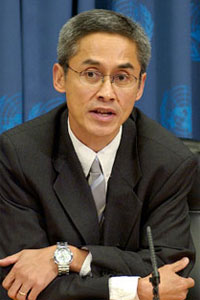
It was the country's people-based 16th constitution (1997) which established Thailand's National Human Rights Commission. The expectation was that the commission would act as a promoter and protector of human rights, with due regard for universal standards, complementing the constitution and national laws. It would also be a check and balance mechanism, especially where the traditional pillars of the state might not be fulfilling their tasks or impinge on human rights.
Today the commission is part of global network of over 100 national human rights institutions, under an umbrella organisation known as the Global Alliance of National Human Rights Institutions (previously known as "the International Coordination Committee"). The alliance gives accreditation to members, based upon various criteria known as the "Paris Principles" concerning national human rights institutions, adopted by the UN General Assembly in 1993, namely: a broad mandate, autonomy from the government, independence of action, pluralism of composition, adequate resources and adequate investigation powers. Those institutions adhering to these criteria are classified as grade A, followed by those in an ambivalent situation classified as grade B, and those under par classified as grade C.
Interestingly, the record of this country's commission has been through three phases in a state of flux, paralleling the history of the country. Gradation of its status by the alliance has also fluctuated. The first phase was from 1997 onwards till 2007 when a new constitution (the 18th) took effect after a coup. The second phase was from 2007 onwards till 2017 when another constitution (the 20th) took effect also after another coup. Now the third phase has begun, bolstered by not only a new constitution but also a new organic law concerning the commission, operational since the end of 2017.
A key strength at the time of the first phase was that the selection process for the 11 members of the commission was very participatory. The selection committee was composed of over 20 people, about half of whom were drawn from civil society. This provided the underpinning for choosing the candidates independently of influence from the executive branch of government and in a spirit of pluralism. The commission was also accorded grade A by the international community.
However, the powers of the commission were constrained by the fact that even though it could send reports and recommendations to the executive branch in the quest of remedies, reaction from the latter was muted. In regard to investigations, the commission was faced with a large backlog of cases during its tenure. Moreover, it could not litigate before the courts and had to go through the country's ombudsperson to access the courts.
The second phase of the commission's history was undermined by the fact that under the 2007 constitution, civil society participation in the selection committee was severely curtailed. The seven-member selection committee comprised mainly the judiciary, together with a couple of politicians. This lack of public participation undermined the credibility of those who were selected as commissioners. The number of commissioners was also reduced to seven. In the functioning of the commission, other impediments to its effectiveness arose, particularly the lengthy process of investigations, bearing in mind that as from 2010, this was a time of volatile political confrontations. The law was also unclear concerning whether the Commission would enjoy immunity from litigation.
During this second phase, the status of the commission was downgraded by the international community to grade B, primarily in regard to issues concerning its independence and effectiveness. Ironically, during this phase, the commission had more powers than during the first phase. Under the 2007 constitution, the commission could take cases directly to court, ranging from the Constitutional Court to the Administrative Court, as well as ordinary courts of law, without having to go through the country's ombudsperson. Yet, it also suffered from the fact that when it made recommendations to the government to take action to remedy violations, the reaction remained muted.
The downgrade of the status of the commission in the eyes of the international community had substantial impact on the drafting of the most recent constitution and organic law concerning the commission. Significantly, in this third phase, the selection committee for the members of the commission has become more participatory: there are now officially 11 members, ranging from judges to politicians, with about half of the other members drawn from civil society. The number of the current selection committee stands at 10 people, since full representation from the political parties has to await elections.
The commission also faces fixed deadlines to prove its effectiveness. Reports concerning violations are to be completed in 90 days (extendable), while other reports are to be completed in 180 days.
Failure to submit reports on time may lead to the dismissal of the commissioners. On a more constructive front, the executive branch has also set up a committee to receive reports from the commission and to follow-up.
However, unlike during the second phase, the powers of the current commission to take cases to court have been constrained. It can only take cases to the criminal court where the victims are unable to do so, while in regard to the other courts, it has to act through the good auspices of the national ombudsman. On a more salutary note, under the new organic law, there is now a stipulation guaranteeing the commission's immunity from litigation.
The selection of the seven new commissioners is pending. Yet, there remains an intriguing question. Will the commission's status be upgraded soon?
Ultimately, it is not the form which counts but the substance which matters, especially through the lens of both human rights and democracy.
Vitit Muntarbhorn is a Professor Emeritus at the Faculty of Law, Chulalongkorn University. He was formerly a UN Special Rapporteur, UN Independent Expert and member of UN Commissions of Inquiry on human rights. He is the author of Unity in Connectivity? Evolving Human Rights Mechanisms in the Asean Region.
